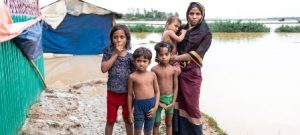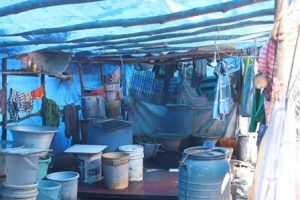Shattered Lives of Rohingyas
Rohingyas are the most persecuted minorities in the world. The stateless ethnic group of people are finding much more relief in camps than they did back at homes.

As we enter the tarpaulin shanties of Kelambakkam Rohingya relief camp, we are welcomed by a group of kids playing. The look on their faces seems to suggest that things are fine even with the scars of the past. Ladies are busy doing household chores outside their huts, whereas the men have gone to work at the nearby worksites or shops to meet their ends.
Initially, a few of them seemed slightly hesitant as one of the women tells us that they would not like themselves to be videographed or photographed. Nafisa (Name changed) still in her late teens spoke to us in Urdu (dialect spoken widely in Rakhine state) explaining how life has changed after migrating to Chennai. She said Chennai is safe as compared to Myanmar, where there was constant bombings and threats to their lives and livelihood.
The largest number of Rohingya refugees moved to neighbouring Bangladesh; as per the estimates, there are about 1.2 million refugees. The UN refers Rohingyas to be the most persecuted minorities in the world. They were mostly treated as inferior citizens in their own homeland, where there were frequent military crackdown for many years starting from 1978, 1991, 2012, 2015, 2016 and 2017. Nafisa says that they arrived in Chennai in 2012 amidst uncertainty as to how would their life will be in completely unknown territory, but to her surprise, she finds people friendly and there hasn’t been any instance where she felt out of place.
Also Read : Aung San Sui Kyis Reputation In Perils Or Is The Fate Of The Rohingya
Issue at Hand
They are different from the Burmese group as they spoke in a dialect much similar to Bengali than the local Burmese. But the majority of them are followers of Islam. They were denied citizenship by Myanmar. They were classified as ‘resident foreigners or associate citizens’. Ethnically, they are much closer to India and Bangladesh Indo-Aryan people than to the country’s Sino-Tibetans. Religious and ethnic tensions between Rohingya Muslims and the Rakhine Buddhists (which make up the majority of Myanmar’s population) escalated into widespread, deadly riots a few years ago. Hundreds of thousands had to flee! Continuing violent attacks have forced more people to leave their homes ever since.
The Myanmar government says that the people of Rohingya are not Burmese citizens, but for generations, the Rohingya have been living in Myanmar. The government has stripped them of their citizenship, where they can’t claim any right over their land. Rohingya are being abused and exploited extensively. They’re one of the world’s most persecuted minorities. Nearly 7 lakh Rohingya refugees fled to overcrowded camps in Bangladesh, which in November 2017 signed a repatriation agreement with Myanmar and was to begin sending back refugees from the cut-off date. Most of them were hesitant to get back as the situation there is worse, fearing that they could be killed. Hence, significant numbers took refuge in India and are residing in camps at Delhi, Kolkata, Chennai and Hyderabad.
Kelambakkam: Adopted Home

They live in the bustling suburb of Chennai surrounded by IT parks, residential complexes, hotels and chain of hospitals due to which men find it easy to find jobs nearby. The place is also close to a primary health centre and panchayat primary school, where most children go to attend schools and they are taught Tamil; in fact, one can see kids conversing in Tamil fluently along with their tongue. Noor in her early 20s is one such example as she speaks such fluent Tamil that one would easily mistake her for a local. She recalls a tough ordeal, that is, while stitching a piece of cloth with her mother, how they had to face injustice in their home state of Rakhine back during the civil war; in order to save their lives they were forced to flee their home.
Most of them do not complain as they feel the government has done enough to protect them by providing them with free electricity, power and water to them.
They are in fact grateful as some of them have even received Aadhar cards through which they can avail government food items via Ration shops. The UNHRC has eased the process for them to apply for permanent residency. Their only concern is that they want proper houses with adequate toilet facilities.
Also Read : Refugees Or Foreigners
Prevailing Crisis
When asked about going back to Myanmar, Maria strongly feels that as long as the war doesn’t end, they prefer here in the camps. She recalls the military atrocities on Rohingyas with the help of the government like setting their houses on fire, bombing, rape during the peak of the war in 2012. After migrating to India, many have lost touch with their loved ones as they are scattered in different regions. Currently, the camp in Kelambakkam hosts around 60 people since many have left Chennai to other places for better opportunities.
Indian government’s recent Citizenship bill has raised a lot of eyebrows as the Indian government sees Rohingya’s scene to be a threat to National security. Several Rohingya refugees were deported back to Myanmar. Critics hit out at the government that the bill is largely biased on the ethnic and religion. Whereas, religious groups such as Hindus, Christians, Buddhists, Sikhs, Jains and Parsis are given citizenship after six years from the date of arrival.
